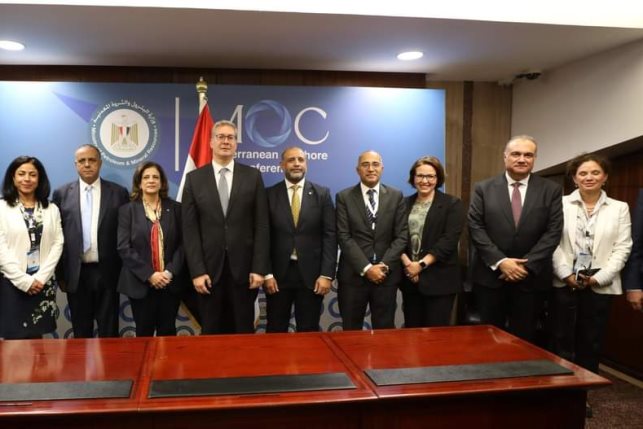Interview: Intel Egypt achieves 93% renewable electricity and 67% waste upcycling globally
In this interview, Nour-Eldin Zaki, Intel Egypt's Country Lead, sheds light on the key initiatives and achievements outlined in the report, as well as the challenges and opportunities that lie ahead for Intel's CSR efforts.

Corporate social responsibility (CSR) is an integral part of Intel's values and operations. The company has made significant strides in promoting sustainability, diversity, and ethical business practices, among other important issues. To discuss Intel's latest CSR report and its impact on the company's operations, Business Today Egypt (BT) recently had the opportunity to speak with Nour-Eldin Zaki, Intel Egypt's Country Lead. In this interview, Nour sheds light on the key initiatives and achievements outlined in the report, as well as the challenges and opportunities that lie ahead for Intel's CSR efforts.

• With the release of the latest CSR report, can you start off by explaining Intel’s strategy when it comes to being responsible?
Intel’s commitment to positive global impact is embedded in our purpose to create technology that enriches the life of every person on earth. Sustainability is integral to Intel’s DNA which is evident in our long track record of setting ambitious goals and transparently reporting on our performance. In May 2020, we laid out our 2030 RISE strategy and goals, since then we have made considerable progress on those goals. Through our RISE strategy, we work on creating a more responsible, inclusive, and sustainable world, enabled through technology and our collective actions. The responsibility pillar empowers us to build on our long history as a leader in corporate citizenship, further advancing safety, wellness, and responsible business practices across our global manufacturing operations, our value chain, and beyond.
Through inclusivity, we are advancing diversity, equity, accessibility, and inclusion in our global workforce, and advocating for public policies and laws that combat discrimination and inequities impacting our employees and our communities. By driving to the lowest possible environmental footprint as we grow, we are ensuring sustainability towards the environment in our operations and beyond. We are also equally committed to enabling a better world through the power of our technology and the expertise and passion of our employees.
We continue to raise the bar for ourselves and leverage our leadership position in the global technology ecosystem to make greater strides in corporate responsibility and apply technology to address social and environmental challenges. As such, in April 2022 we announced our commitment to achieve net-zero greenhouse gas (GHG) emissions across our global operations through Scope 1 and 2 by 2040.
• What array of measures are you employing to implement this vision?
We believe that having an integrated strategy and embedding corporate responsibility across the company is the most effective management approach to drive continuous improvements in our performance. To implement this, we have developed corporate guidelines and policies that take into account the concept of shared value and frameworks such as the UN Global Compact, International Labour Standards, OECD Guidelines for Multinational Enterprises, and the UN Sustainable Development Goals.
Putting this into action, we have established cross-functional Management Review Committees (MRCs) of senior executives who are responsible for managing corporate responsibility and sustainability activities across the organization, many Intel business groups have also established teams dedicated to corporate responsibility issues.
Our global Corporate Responsibility Office acts as an internal adviser to drive strategic alignment and incorporate external stakeholder input into decisions and processes. We established formal Board-level oversight for corporate responsibility in 2003. The Board’s Corporate Governance and Nominating (CGN) Committee has primary responsibility for oversight of ESG issues at Intel. Management provides formal updates to the CGN Committee at least twice each year and at least annually to the full Board on the company’s ESG performance and disclosure. In 2022, this included review of the annual Corporate Responsibility Report and updates on issues including environmental sustainability, climate risk, human capital, human rights, political accountability, and investor outreach and feedback.
• What would you say are the major highlights from this year’s report?
Over the past year, we have had some incredible achievements implementing sustainability at an industry level. As a leader in advancing safety, wellness, and responsible business practices, this year, we honored 57 employees for their work in advancing Intel’s safety culture through the Intel Safety Always-Safety Star program. Externally, we shared details of our responsible AI strategy, which aims to enable Intel to leverage its place in the AI value chain, drive meaningful progress, and scale efforts broadly. In our efforts to protect human rights in the supply chain, suppliers in our global supply chain have returned more than $26 million in fees to their workers since 2014.
Our diversity, equity, and inclusion agenda saw our early achievement of the RISE goal to double annual spending with diverse suppliers. We also achieved three other goals early: spend $500 million annually with women owned suppliers outside the US by the end of 2025 and $800 million annually with minority-owned suppliers globally by the end of 2023.
On the sustainability level, we managed to save 9.6 billion gallons of water in our operations and community collaborations and enabled restoration of 3.0 billion gallons through watershed restoration projects. We have also reached 93% renewable electricity usage globally and upcycled 67% of manufacturing waste with circular economy practices including reuse, recovery, or recycling.
As part of our efforts in enabling our employees and the communities we operate in, Intel employees and retirees around the world have donated around 1,010,000 hours of service to schools and nonprofit organizations to support local communities. Through the Intel RISE Technology Initiative (IRTI), we have cumulatively committed approximately $70 million since 2020 to some 335 projects in 33 countries, addressing health and life sciences, education, economic recovery, social equity and human rights, accessibility, and sustainability. And last but not least, the Intel Foundation, launched in 1988, has enabled positive social impact for our local communities and for underserved populations through more than $793 million in funding of programs and STEM initiatives.
.jpeg)
• How did Intel’ achievements resonate with the business community?
We believe that third-party ratings and rankings give us valuable feedback on our programs and practices and help drive continuous improvement over time. In 2022 we have been recognized with a number of corporate responsibility-related awards and recognitions such as Bloomberg’s Gender-Equality Index, Human Rights Campaign’s Corporate Equality Index, Women Engineer Magazine’s Top 50 Employers (readers’ choice), US Environmental Protection Agency with 3rd ranking on Green Power Partnership National Top 100, Wall Street Journal’s Management Top 250 and In 2023, for the 13th year, Ethisphere Institute named Intel to its annual list of the World’s Most Ethical Companies. Intel was also named a “Trendsetter” company in the 2022 CPA-Zicklin Index of Corporate Political Disclosure and Accountability.
• How does Intel promote and drive action around its ESG strategy and good practices with global policy and decision makers?
Intel works with governments, organizations, and industries around the world to advocate for policies that encourage new ideas, promote fair commerce, and protect resources. Together with other technology companies, we continued our commitment to the Digital Climate Alliance to advance discussions with policymakers on the value and opportunity of the information and communications technology (ICT) “handprint,” or the ways in which technology can be applied to help reduce climate impact. With our homes, cars, buildings all being integrated with “smart” devices that allow them to be connected to the internet, cloud computers, and AI, the Digital Climate Alliance sees an opportunity to integrate climate policy with interconnected data and digital tools.
We also engage with trade associations to help us work collaboratively with other companies and groups to address key public policy issues on a range of corporate responsibility and sustainability issues. Recent examples include collaborating with the Center for Climate and Energy Solutions to encourage climate action and partnering with the Responsible Business Alliance (RBA), Responsible Minerals Initiative (RMI), Responsible Labor Initiative (RLI), and other stakeholders to educate policymakers on the benefits of collective action on responsible global supply chain practices. We are also working with the RBA, Digital Europe, and other stakeholders to improve the knowledge and understanding of policymakers on the benefits of common approaches to responsible business conduct and to align future due diligence requirements with existing international frameworks.
.jpeg)
• Why is Intel focusing on increasing diverse supplier spending?
Intel’s commitment to a more inclusive supply chain allows us to leverage our purchasing power to address social gaps in our pursuit of fair business practices. Beyond the impact that our technology has on people’s lives, we strive to make a positive difference in our supply chain and in our communities. Developing a diverse semiconductor ecosystem creates equitable opportunities for individuals from historically underserved groups and helps uplift their communities. By working with diverse-owned suppliers, we increase our resilience, and generate new value within our global supply chain and the communities in which we operate.
A diverse and inclusive supply chain also introduces greater competition and helps drive innovation. Diverse-owned suppliers have proven to bring different perspectives and innovative solutions that benefit our customers and stakeholders. For example, when larger direct suppliers could not deliver a critical component last year, a woman-owned supplier successfully filled the gap to help Intel fulfill a customer commitment.
Since launching our renewed supplier diversity and inclusion (SD&I) commitment in 2015, we have also seen the direct impact of increased competition within our supply chain. Four of the five diverse suppliers on Intel’s supplier scorecard are outperforming their competitors.
• Since Intel managed to achieve its targeted diverse supplier spending significantly ahead of the previously committed timeline, what’s next?
We did manage to reach our goal early on, but we are not done. For Intel, supplier diversity is not added work; it’s how we work. We are currently working on establishing a new goal against a renewed timeline and will continue to focus on maintaining our progress and providing opportunities for diverse suppliers and subcontractors to help us in this transformation.
For every new sourcing opportunity, our procurement teams will continue to include at least one diverse-owned company in the bidding process. For our larger contracts where there aren’t diverse supplier options at the scale or expertise required, we include diverse spending expectations in negotiations. Doing so can lead to greater commitments than anticipated. For example, the first general contractor for our Ohio project committed to 20% diverse spending, exceeding the 10% expectation outlined in our Supplier Diversity Policy. Internal diverse spending goals will continue to be included as part of Intel’s annual employee bonus structure, highlighting the importance not only in procurement but across all business units.
• How far do you involve the different stakeholders and engage them in Intel’s ESG practices?
Since 2008, we have linked a portion of our executive and employee compensation to corporate responsibility factors in our Annual Performance Bonus. In 2022, we included ESG metrics aligned with our culture transformation and RISE goals, including diversity and inclusion, employee experience, climate change, and water stewardship.
Adding to this, our integrated outreach team, led by our Investor Relations group, Corporate Responsibility Office, Human Resources, and Corporate Strategy Office—and including representatives from other business groups—met in fall 2022 to discuss a wide range of issues, including ESG topics, with investors representing approximately 49% of our outstanding shares. We believe that our approach to engaging openly and year-round with our investors regarding ESG issues drives increased corporate accountability, improves decision making, and ultimately creates long-term value. The feedback we receive through our investor outreach activities is communicated to Intel’s Board of Directors and relevant committees throughout the year.

• Does Intel’s core business align with its ESG practices?
Intel is at the forefront of developing new semiconductor technologies, products, and solutions as building blocks for an increasingly smart and connected world across a broad spectrum of markets. Our people build our technology, unlock new business opportunities, and work with our business associates and customers to create global impact. This year we launched the 4th Gen Intel® Xeon® Scalable processors (also known as Sapphire Rapids), Intel’s most sustainable data center processors. The new processors deliver customers a leap in data center performance, efficiency, security, and new capabilities for AI, the cloud, the network and edge, and the world’s most powerful supercomputers.
As we expand our product portfolio, we’re also celebrating our geographical expansion as we broke ground on two new leading-edge chip factories in Ohio, and also unveiled plans for a decade-long investment in the European Union with plans to build a leading-edge semiconductor mega-site in Germany and to invest in R&D, manufacturing, and foundry services in Europe.





